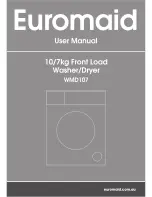
26
TROUBLESHOOTING
The appliance is equipped with an automatic error-monitoring system to detect and diagnose problems at an early
stage. If the appliance does not function properly or does not function at all, check the following before you call for
service:
Diagnosing Problems
Symptoms
Reason
Solution
Appliance will not turn
on
Power cord is not properly plugged in.
•
Make sure that the plug is securely
plugged into a grounded outlet matching
the appliance’s rating plate.
House fuse is blown, circuit breaker
has tripped, or power outage has
occurred.
•
Reset circuit breaker or replace fuse. Do
not increase fuse capacity. If the problem
is a circuit overload, have it corrected by
a qualified electrician.
Appliance does not
heat
House fuse is blown, circuit breaker
has tripped, or power outage has
occurred.
•
Reset circuit breaker or replace fuse. Do
not increase fuse capacity. If the problem
is a circuit overload, have it corrected by
a qualified electrician.
Clothes take too long to
dry
Load is not properly sorted.
•
Separate heavy items from lightweight
items. Larger and heavier items take
longer to dry. Light items in a load with
heavy items can fool the sensor because
the light items dry faster.
Large load of heavy fabrics.
•
Heavy fabrics take longer to dry because
they tend to retain more moisture. To help
reduce and maintain more consistent
drying times for large and heavy fabrics,
separate these items into smaller loads of
a consistent size.
Appliance controls are not set
properly.
•
Use the appropriate control settings for
the type of load you are drying. Some
loads may require an adjustment of the
dry level setting for proper drying.
Lint filter needs to be cleaned.
•
Remove the lint from the lint filter before
every cycle. With the lint removed, hold
the lint filter up to a light to see if it is dirty
or clogged. With some loads that produce
high amounts of lint, such as new bath
towels, it may be necessary to pause the
cycle and clean the filter during the cycle.











































